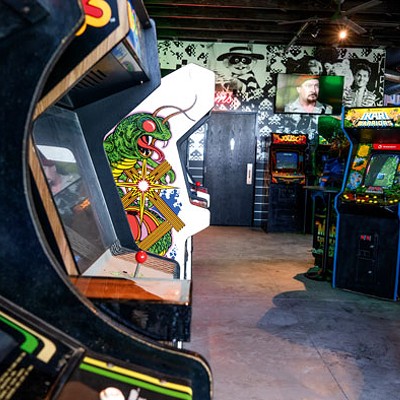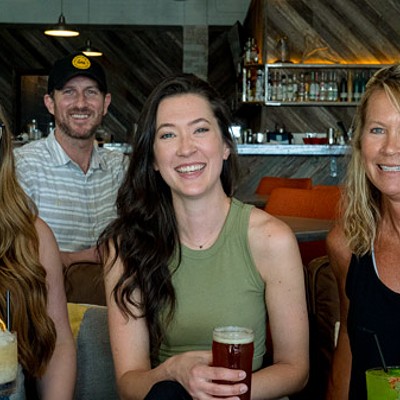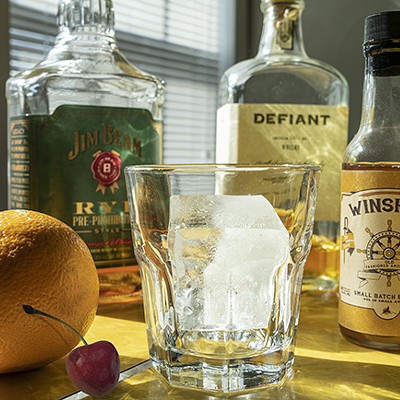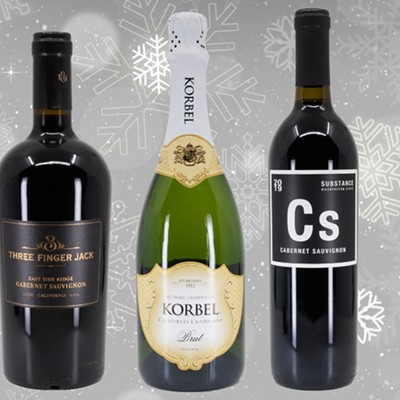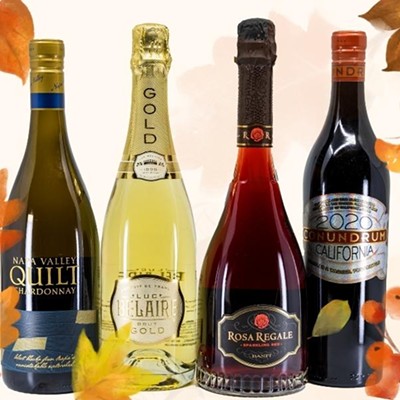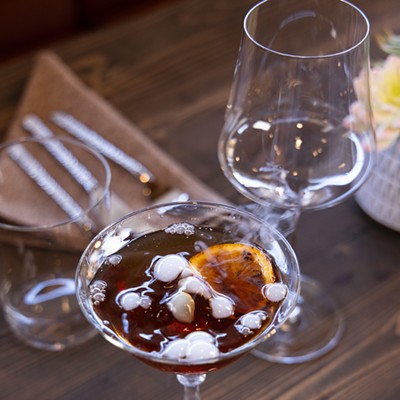It may be unusual to hear smacktalk from a man of the cloth, but those were his words about spouse SunSoo Chong’s cooking. He explained that in their Korean homeland, the trend has been toward adding more sugar and MSG to recipes.
This goes against their mission statement on the menu that reads, in part: “to provide a fusion of Asian foods that is healthy and homemade without preservatives and additives.”
right In Moore, Fusion Cafe’s chicken wings join side items for a spicy, hearty meal.
The small restaurant they operate with this goal in mind is very much a family enterprise, with their son and daughters having been either past or current employees. The spacious dining room is simply furnished and decorated with tropical plants and Korean ceramics on shelves.
The menu is posted on the wall behind the counter, and you may select soft drinks (but no booze) from a refrigerated glass case. Your order is brought to the table. Besides being healthy, Fusion is green, too. There’s a sign over the serve-yourself side-dish bar that states, “Don’t take more than you need. Don’t waste paper here.”
Although there are three delicious teriyaki entrées available, I’ll let you in on a secret: This is first and foremost a Korean restaurant. The “fusion” in the cafe’s name is as much about a merger with American tastes as with those of Japan. Once past the pan-Asian appetizers that include egg rolls (3 for $3), edamame ($3) and shumai shrimp dumplings (7 for $4), you’re in the authentic Korean cuisine zone. That’s a good place to be.
Most dishes include visits to the unlimited side-dish bar. The staple of Korean eating is kimchee, and every family has their own take on the distinctive fermented cabbage and garlic mixture. In the cuisine it’s somewhere between being a condiment, salad and staff of life. Fusion’s version is mildly fragrant and slightly sweet, a delicate pink color from liberal inclusion of red pepper in the fermentation process. It’s at the center of the side-dish bar, surrounded by cubed daikon radish, bean sprouts, jalapeño peppers and fried eggs with scallions.
Spicy potato stew ($7.95) is one of Chong’s signature dishes. It’s a bold
meat broth with a big, whole spud filling the bowl. Understand that the
Koreans have a reputation as being the tough guys of Asia. There’s
nothing subtle about this stew. It looks and tastes like badass hombre
food — the kind of fillup you’d want after a long day working in the
fields or patrolling a frozen border.
Dried pollock soup ($8.95) is a dish I wasn’t familiar with.
Major points for combining cultures comes in the form of Buffalo chicken wings getting a taekwondo kick.
Like
Mexican menudo, I learned later it’s the traditional Korean hangover
cure. Salted and cured North Sea pollock fish is sautéed quickly in
sesame oil with garlic, daikon, fish sauce and green onions, before
being boiled into soup. It’s one of the menu selections that would
benefit from a description beyond the name. Cold noodles in soy milk
($7.95) could use a word sketch as well.
Several
entrées involve a choice of chicken, beef or tofu served spicy Korean
bulgogi style or in teriyaki sauce. They’re stir-fried with carrots,
radish, scallions, sesame seed and served with rice. The bulgogi dishes
may be ordered on a one to 10 spicy index, and my five was too mild.
Next time, I’d have Mrs. Chong crank it up to eight.
Major
points for combining cultures come in the form of Buffalo chicken wings
getting a taekwondo kick with your choice of straight-up hot sauce,
teriyaki or garlic soy sauce. Order them by the half-dozen ($5.75),
dozen ($10) or two-dozen ($20). Soups round out the rest of the menu,
including seafood tofu ($8.95), spicy shredded beef ($9.95) and beef
bone ($8.95). If you’re ready for a Seoul food adventure, try the chef’s
specialty ($11.95) — goat stew.
Photo by Mark Hancock
Oklahoma
Gazette’s restaurant review policy is to highlight the positive
aspects, and include constructive criticism regarding food, ambience or
service when appropriate.

